Best Guitar Strings
Best Overall Acoustic Guitar Strings
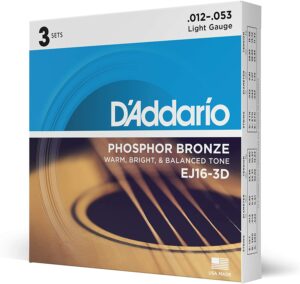
Best Overall Electric Guitar Strings
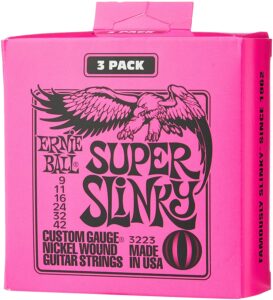
Best Acoustic Guitar Strings for Beginners
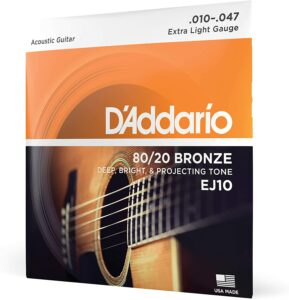
Best Electric Guitar Strings for Beginners
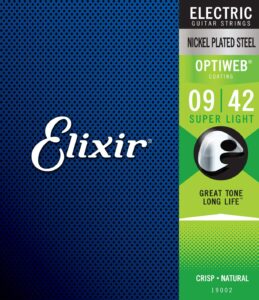
Best Electric Guitar Strings for Rock and Metal
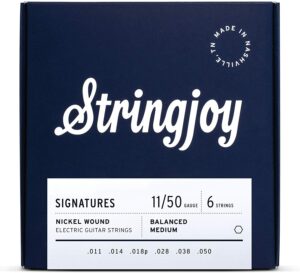
Best Electric Guitar Strings for Drop and Low Tuning
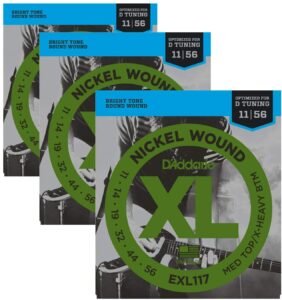
But first – what are guitar strings?
Without strings, playing the guitar would not be possible. Guitars typically have six strings, each of a slightly different width. Each string on a guitar corresponds to the different notes E-A-D-G-B-E from the lowest to the highest pitch.
You may be wondering if different strings make a difference to the sound your guitar makes. Different strings do sound distinct on different guitars. Before going any further, it’s important to outline the general different types of guitar strings.
The different types of guitar strings
The five main string types are of different materials:
- Steel & nickel: Steel is the most common material for guitar strings. The thickest strings have a nickel coating. Nickel strings have a richer tone while steel strings are lighter and brighter. Pure stainless steel strings have a bright tone and very little squeak as the fingers move up and down the strings.
- Brass & bronze: Brass and bronze are common for acoustic guitar strings.
- Nylon: Nylon strings are typical for classical guitars and are great for playing folk music.
What makes guitar strings great
The best strings should sound pleasant to the ear and feel comfortable to play. When we chose our list of the best guitar strings, we looked for the following defining characteristics:
String construction
Just as material makes a difference as to the way guitar strings play and sound, so too does the construction of the strings. There are few different factors that go into the functioning and building of strings on a guitar:
- Thickness/gauge: the thicker the string the warmer and louder the sound. Gauge of strings is another word for their size. Thinner strings are usually lighter and easier to play. Thicker strings are better for strumming while thinner strings are ideal for plucking. When deciding on the right string gauge for you, you should consider your playing style first and foremost.
- Winding type: the winding type determines the texture of guitar strings.
The other thing to consider is the type of guitar string cores:
- Hex core: as you probably assumed, this core wire has a hexagonal shape, giving it a consistent tone all the way up and down the string.
- Round core: jazz and folk music mesh well with strings with a round core due to the emphasis on lightness. Keep in mind that round core strings are likely to fall out of tune more often than hex core strings.
Durability
The primary indicator of a string’s durability is its coating. Coated strings ward resist factors, like grease and grime, that could adversely damage a guitar’s strings. While coated strings do tend to run on the pricier side unlike uncoated strings, they last for significantly longer periods of time.
Playability
String materials and gauge largely impact playability. Of course playability of a guitar’s strings also greatly depends on your playing style:
- For light fingerpicking: opt for strings with a lighter gauge.
- For both fingerpicking and strumming: opt for strings with a medium gauge.
- For heavy strumming: opt for strings with a medium-heavy gauge.
Something to keep in mind is that higher gauges are more difficult for beginners.
Sound
Sound is really up to personal preference. Decide on whether or not you prefer a lighter or heavier sound when choosing the string material and gauge to go with. The most important factor to look for when assessing strings’ sound is consistency. If you’ve been playing guitar for a while, you may even be able to recognize slight changes in gauge by the sound.
Best Overall Acoustic Guitar Strings

Since 1974 musicians have loved these D’Addario strings known for their playability. In fact, some musicians play these strings just for their historical significance. The well-balanced and bright tone that these strings produce is ideal for an acoustic guitar player. Suitable for any type of player, from beginner to expert, the strings come in five gauge levels.
Classic hexagonal core
The bronze wiring of these strings hugs around a hex core to deliver a consistent, long tone. The sound is bright and clear. Reviewers say these strings feel good, look good, and sound good too.
Best Overall Electric Guitar Strings

The best electric guitar strings on the market worldwide, if you play electric look no further. The nickel plated steel of the strings wraps around a high carbon hex steel core for a strong and consistent tone. The strings come in a variety of materials depending on the sound you desire, from stainless steel to super cobalt alloy.
An industry icon’s creation
The popular gauges of these strings were the brainchild of Ernie Ball. Musicians like Paul McCartney, Eric Clapton, and Keith Richards all use Ernie Ball strings.
Best Acoustic Guitar Strings for Beginners

The precision hex core string’s wrap wire grips the core to create stability, durability, and intonation. These are the go to strings for a brand new acoustic guitar player.
Easy to play, easy to bend
The reason these strings are so great for beginners is because of the extra light gauge (10-47) which makes them both easy to play and easy to bend.
Best Electric Guitar Strings for Beginners

The nickel-plated steel combined with the light gauge of these strings make them perfect for a newcomer to the electric guitar. Reviewers say that the strings have a noticeably comfortable feel when you play.
Great tuning stability
Sometimes strings with a lighter gauge have less stability and consistency when it comes to tuning the guitar. These strings, however, have impressive tuning stability that lasts for hours of play. The strings’ materials combat corrosion and protect strings from dirt, sweat, and humidity.
Best Electric Guitar Strings for Rock and Metal

Musicians who play the heavier genres like rock and metal will love these strings. All the wires come from the USA. We love that each string undergoes handcrafting at the Stringjoy shop in Nashville.
Smooth, even performance
The mathematical optimization of these strings makes for even performance across the fretboard. The medium gauge and nickel wound string creates a sturdier sound. From the first note to the final bar, you’ll hit the sweet spot of sound with these strings.
Best Electric Guitar Strings for Drop and Low Tuning

This is the ideal guitar string candidate for drop and low tuning. These strings by D’Addario are some of the most popular strings on offer. The gauge has a medium-sized top and an extra heavy bottom. This combination of thickness and gauging is what makes it so great for drop tuning.
But first- what is drop D tuning?
It is a type of tuning in which the lowest string E tunes down to D. It allows for a lower octave of playing. It can also allow the full sonority of the guitar to come out. Even as you tune down the strings on these guitars they retain their tension.
FAQs about Guitar Strings
Is there a best guitar string brand?
There are a couple of guitar string brands that are more popular amongst musicians. In fact, you’ve probably noticed that some of your favorite musicians use these popular brands like Ernie Ball and D’Addario. Brand, however, should not be the ultimate deciding factor when choosing your best guitar strings. Think about the sound you’re after, the kind of guitar you play, and whether or not you’re a beginner or an experienced player.
Should I wipe down my guitar strings?
Some people say that wiping down your guitar strings between playing is a must-do. You should wipe down your strings with a microfiber cloth before you play to remove debris and moisture. You should also clean your strings after you play. Oil and dirt from the hands collects along the fretboard, causing decay to the strings. Do not use household cleaners on your guitar strings.
Can I string my guitar myself?
While it’s easier to have someone string your guitar for you, few people actually pay to have their guitars strung. Stringing a guitar is actually much easier than it seems. You can do it by hand or using a winder by following an online guide or tutorial.
How often should I change my guitar strings?
The rule of thumb is to change your guitar strings every 100 hours of play (roughly three months). An electric guitar’s strings need replacing more often. If your strings produce a dull tone or feel dirty to the touch, you probably need new strings.

